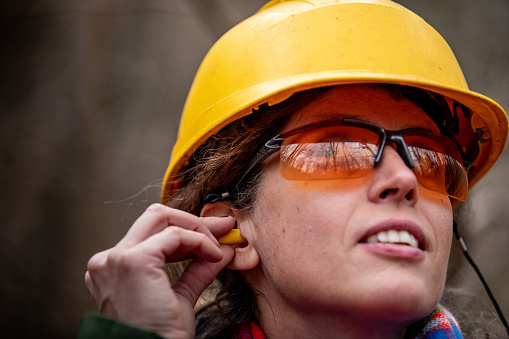More people should protect their hearing from the effects of severe noise. Because humans adapt quickly to their surroundings, when we are exposed to a noisy environment, we may not notice the noise level in our surroundings after a few minutes. When people work in a noisy environment, they take the presence of noise for granted, which does not make us feel that the noise is damaging your hearing, causing us to not realize the importance of using hearing protection in the workplace. Not only for the longevity of people's senses, but also as a necessity to maintain a high quality of life, everyone should be aware of the importance of using hearing protection in the workplace. Working long hours in a noisy environment can cause severe hearing loss, so it is important to use hearing protection in the workplace.
Air compressors - up to 92 decibels from 3 feet away can cause hearing loss in 2 hours
Electric drill - up to 98 decibels, causing hearing loss after 30 minutes
Typical factory - up to 100 decibels with exposure time of 15 minutes can cause hearing loss
Chainsaws - up to 110 decibels at 3 feet away, causing permanent hearing loss in 2 minutes
In short, if workers are working in a noisy environment without any hearing protection, the potential for hearing loss is high. The only way to know the exact noise level to which workers are exposed is to use specialized equipment for noise monitoring, although this is only necessary when exposure is 85 decibels or more. If employees are complaining of high noise levels, there are indications that employees are losing their hearing, or the noise level is preventing normal conversation, then it is possible that the current work environment has very high noise levels. These conditions may not occur throughout the work site and are likely to be limited to specific tasks or machinery and equipment. We should understand the importance of using hearing protection in the workplace and how to protect our hearing health.

The best protection we can provide is to eliminate hazards, but in practice, this is not easy to achieve. We can also work to reduce the level of noise to which our employees are exposed. Some tools and machines, which can be used at lower decibels, reduce the risk of hearing loss. We can also implement management controls, such as limiting the amount of time employees spend working in high decibel environments or limiting the amount of time they spend using specific tools and equipment.
Our final line of protection is personal protective equipment that meets OSHA hearing protection requirements. Earplugsand earmuffs can reduce decibel exposure and provide hearing protection. Maximum protection can be provided by properly inserting ear plugs. Ear muffs can also reduce decibel exposure, but not to the same extent as ear plugs. However, they are easier to wear properly, which is why some workers prefer them.
The growing problem of hearing damage today is closely related to the environment in which we live and work. After all, we live in a noisy world, such as from the sound of busy city traffic sirens, heavy machinery running in industrial areas, the noise of trains passing by, and even music playing at maximum volume can be a noise. So, noisy noise is common and too much of it can lead to hearing loss.
Admittedly, the tools we use at work also generate a lot of noise, but that doesn't necessarily mean employees will lose their hearing. When you are working in an environment that can cause damage to the eardrum and other parts of the ear canal, you should wear hearing protection. Eliminate, reduce and prevent potentially damaging noise exposure in the work environment and reduce the likelihood of employees suffering occupational hearing loss by wearing appropriate hearing protection.
T-Safety offers you hearing protection in a variety of styles and supports customization. You can contact us for more information.
Copyright © Hebei Sinotools Industrial Co.,Ltd. All Rights Reserved | Powered by  Sitemap
Sitemap